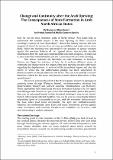Files in this item
Change and continuity after the Arab Uprising : the consequences of state formation in Arab North African states
Item metadata
| dc.contributor.author | Hinnebusch, Raymond | |
| dc.date.accessioned | 2016-06-11T23:32:22Z | |
| dc.date.available | 2016-06-11T23:32:22Z | |
| dc.date.issued | 2015-01-02 | |
| dc.identifier | 158920210 | |
| dc.identifier | 824fb38b-ec0a-4947-aa33-e67df315cc49 | |
| dc.identifier | 84921613861 | |
| dc.identifier | 000347786400002 | |
| dc.identifier.citation | Hinnebusch , R 2015 , ' Change and continuity after the Arab Uprising : the consequences of state formation in Arab North African states ' , British Journal of Middle Eastern Studies , vol. 42 , no. 1 , pp. 12-30 . https://doi.org/10.1080/13530194.2015.973182 | en |
| dc.identifier.issn | 1353-0194 | |
| dc.identifier.other | ORCID: /0000-0001-5800-6606/work/60630200 | |
| dc.identifier.uri | https://hdl.handle.net/10023/8965 | |
| dc.description.abstract | This article provides a comparative macro-level overview of political development in Morocco, Tunisia and Egypt. It examines their evolution from the colonial period through several distinct phases, showing how differences in their origins were followed over time by a certain convergence towards a common post-populist form of authoritarianism, albeit still distinguished according to monarchic and republican legitimacy principles. On this basis, it assesses how past state formation trajectories made the republics more vulnerable to the Arab uprising but also what differences they make for the prospects of post-uprising democratisation. While in Morocco the monarch's legitimacy allows it to continue divide-and-rule politics, in Egypt the army's historic central role in politics has been restored, while in Tunisia the trade union movement has facilitated a greater democratic transition. | |
| dc.format.extent | 270895 | |
| dc.language.iso | eng | |
| dc.relation.ispartof | British Journal of Middle Eastern Studies | en |
| dc.subject | Arab Uprising | en |
| dc.subject | Egypt | en |
| dc.subject | Tunisia | en |
| dc.subject | Morocco | en |
| dc.subject | state formation | en |
| dc.subject | JZ International relations | en |
| dc.subject | SDG 8 - Decent Work and Economic Growth | en |
| dc.subject | SDG 16 - Peace, Justice and Strong Institutions | en |
| dc.subject.lcc | JZ | en |
| dc.title | Change and continuity after the Arab Uprising : the consequences of state formation in Arab North African states | en |
| dc.type | Journal article | en |
| dc.contributor.institution | University of St Andrews. School of International Relations | en |
| dc.identifier.doi | https://doi.org/10.1080/13530194.2015.973182 | |
| dc.description.status | Peer reviewed | en |
| dc.date.embargoedUntil | 2016-06-12 |
This item appears in the following Collection(s)
Items in the St Andrews Research Repository are protected by copyright, with all rights reserved, unless otherwise indicated.

